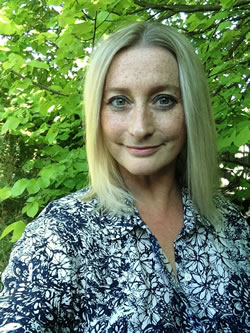|
I don't have an M.F.A., nor an undergraduate degree in creative writing. I didn't spend my early adult life producing stories, only to have them rejected, or writing and storing unpublished manuscripts in my sock drawer.
I believed my high school teachers when they told me there was no money in being an author, and opted for a degree in journalism. I spent years on radio, and then switched to public relations, marketing, and administration. Each of those positions required very different writing techniques, and I learned afresh each time.
But I still wanted to write fiction.
I enrolled in a correspondence course but never completed the first week's homework—recall in detail a childhood incident—because I considered the assignment supremely nosy, and also because my life was boring plot fodder. I wanted to write about things that took me out of myself and into the bigger world. The course went in the bin.
But I still wanted to write fiction.
When my child started kindergarten, I tried again. This time, I simply sat in front of a computer and typed. I began where I left off—high school level—and it was terrible. Purple prose was the kindest thing someone said to me, but I was driven by two thoughts:
- now or never.
- writing is the only thing I can do.
So, I began to learn afresh one more time, first through writing books, then in creative writing workshops, through a diploma at an adult learning college, a mentorship, and then, because the Australian equivalent of an M.F.A. was out of reach, online, and with a writing coach.
Of all the writing styles I encountered, fiction was the most taxing, not because the writing "rules" (such as show, don't tell and use the active voice) were so hard to understand (or ignore judiciously), but because it required a deeper level of introspection and empathy, a poetic approach to the musicality of words, a heightened awareness of setting as character, and the ability to uncover and develop multiple layers within the work. Also, when I was a journalist, the first line was everything. If I got who, what, when, where, why, how right in the first sentence, the remaining paragraphs unfolded themselves as readily as a concertina card holder. Sometimes this worked for stories too, but usually not. It was only in trying, and trying again, that I discovered each story had its own complexities, and I began to let go of the first line.
I'm still learning.
A good writer needs a good rubbish bin. My one strength as a writer is an awareness of how mediocre most of what I write is. Perhaps a good writer is a bad writer who is a better rewriter.—Richard Flanagan
I seem to start from one word, from one little picture, a few more words, ideas so slender they hardly seem to matter.—Elizabeth Jolley
I keep my rejections on an Excel spreadsheet. There are many. The best way I found to avoid misery over rejection was to ensure I had as many stories on submission as possible, so that when the inevitable email arrived, my emotional investment was left relatively unscathed. Every so often, I went through the spreadsheet, counted my "successes" and calculated my hit rate. It remained stable. My aim was to improve that percentage, which was why the emotional investment theory went bust when I saw the hit rate slumping. I experienced a bad patch over the course of a year, the rejections accumulating discourteously, with not even a shortlisting to mist the lens of self-doubt; so much so that, though still submitting, I thought seriously of giving up.
It was then I received the phone call from Glimmer Train to say I won. Suddenly, perseverance was very attractive.
Failure has been my best friend as a writer. It tests you, to see if you have what it takes to see it through.—Markus Zusak
|


